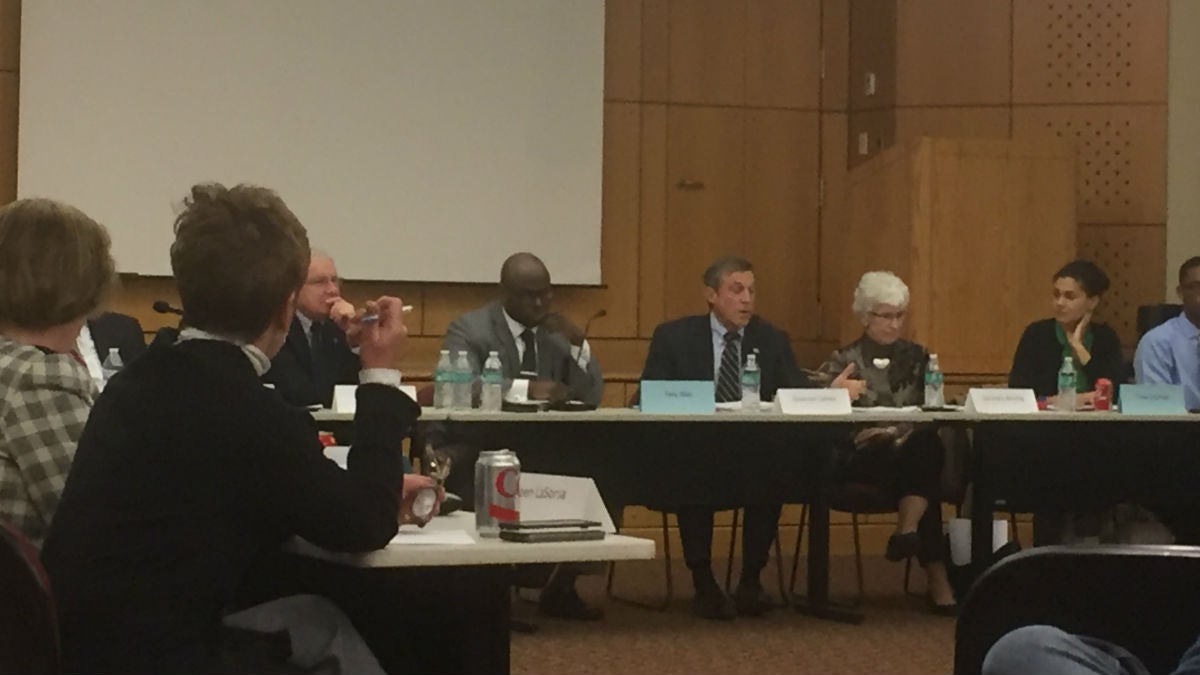Gov. Carney discusses budget concerns during WEIC meeting

Members of the Wilmington Education Improvement Commission meet with Delaware Gov. John Carney in Wilmington Tuesday night. (Zoe Read/WHYY)
Gov. John Carney, D-Delaware, and Education Secretary Susan Bunting met with members of the Wilmington Education Improvement Commission at a public meeting to discuss feasible ways of improving education.
During Tuesday night’s meeting in Wilmington, Carney spoke of financial burdens in the state, and how it would affect WEIC’s goal of moving Christina School District students to the Red Clay Consolidated School District, as well as their proposal for a new state funding formula.
“We’re going to be challenged to keep the long going investments we’ve been making in public education,” Carney said.
WEIC is a 23-member commission appointed by former Gov. Jack Markell, D-Delaware, as a solution to improve low-performing, low-income schools in Wilmington. The group proposed removing Christina from Wilmington and handing over its students to Red Clay as one solution to improving the education of low-income students.
During the meeting, Carney said the redistricting plan would likely not be feasible as long as the state faces a $350 million deficit. He also said WEIC’s proposal to pilot a new state funding formula to provide additional money to low-income students, English language learners and special education students in Wilmington also would burden the state’s budget. Carney said he envisions an “opportunity grant” in conjunction with Title I.
“Having additional funding for weighted student funding for kids with disadvantaged backgrounds is an important objective,” Carney said during an interview. “What I want to make sure is we know what we’re funding fist and we have a plan to improve these schools, and not just throw money at the problem.”
Last year, WEIC asked the General Assembly for $7.5 million annually to cover costs association with the redistricting transition. The General Assembly mulled over the proposal and expressed concern about burdening Red Clay tax payers. It put the proposal on hold until WEIC provided a financial plan.
During Tuesday’s meeting, WEIC released its preliminary fiscal impact analysis for redistricting, which involves the transitioning of 4,357 students, 8 buildings and more than $1 billion in taxable property from Christina to Red Clay.
State and federal resources will be nearly unchanged, the report states, as funding follows the students as they transition. However, new Red Clay expenditures would be greater than its additional revenue, while Christina’s reduced expenditures would be greater than the loss of revenue.
The revenue Red Clay would receive from additional properties would not cover full cost of new students. WEIC originally projected Red Clay’s funding gap would be about $6 million, but current projections show it would actually be between $7.5 and $10.5 million.
In addition, there are several other transition costs for items like employees, programs, technology and transportation that are to be determined.
Tony Allen, WEIC’s Chair, said despite uncertain funding, the commission would continue its mission.
“We put forward a plan, people have rightly critiqued that plan, but there’s been no alternative plan put forward,” he said. “Until such time that exists, there are very few people in Delaware that don’t believe we should have streamlined governance in education, so were hoping some version of our work becomes a part of the final solution.”
Carney said despite the looming deficit, education will be one of his top priorities, and said the work WEIC has done is “incredibly important.”
“The imperative for excelling in education hasn’t ever been greater, particularly for kids growing up in low income neighborhoods, in concentrated poverty neighborhoods in the city of Wilmington,” he said.
“We’ve got a lot of work to do, we can’t fail, the success of our state depends on the success and viability of the city of Wilmington as a commerce center, as a business center, and the city of Wilmington can’t be success if the businesses aren’t successful and if the kids that grow up in the city aren’t successful.”
Carney said he and Bunting will reorganize the Department of Education so it supports the needs of students and teachers in the classroom, hiring staff to focus on those needs, including an employee with an expertise in teaching in urban environments to address challenges in Wilmington.
He also said he will create a plan of action for education, taking the WEIC recommendations into consideration, although he didn’t release a specific timeline for that plan.
“We’ve got to sort out where you’re going to get a bang for your buck and how you’re going to move the needle, what are you actually going to do in these schools and classrooms?” Carney said. “How are you going to get better teachers to make the commitment to teach in these schools? If you look at the data, the more experienced teachers are choosing to teach elsewhere.”
Allen said despite Carney’s apprehension to redistricting and refunding plans, they have more “similarities than differences.”
“There are differences around the how, but not the why, and not the principals within the why, that there is fragmentation that is severely inhibiting Wilmington students and that needs to be solved, and in the same token, there’s this notion of equitable resources for those students, and that also needs to be solved,” he said. “How we do it is the discussion point for both of us.”
Allen said WEIC will continue to work to improve education, even if the legislature doesn’t approve the redistricting plan, and will advocate for funding equity for low income, English language and special education students from kindergarten through third grade.
“We believe if you can get that kind of funding going in three counties and show the material effects of so doing it will have some benefit and people will see the value of expanding state wide,” he said.
WHYY is your source for fact-based, in-depth journalism and information. As a nonprofit organization, we rely on financial support from readers like you. Please give today.





